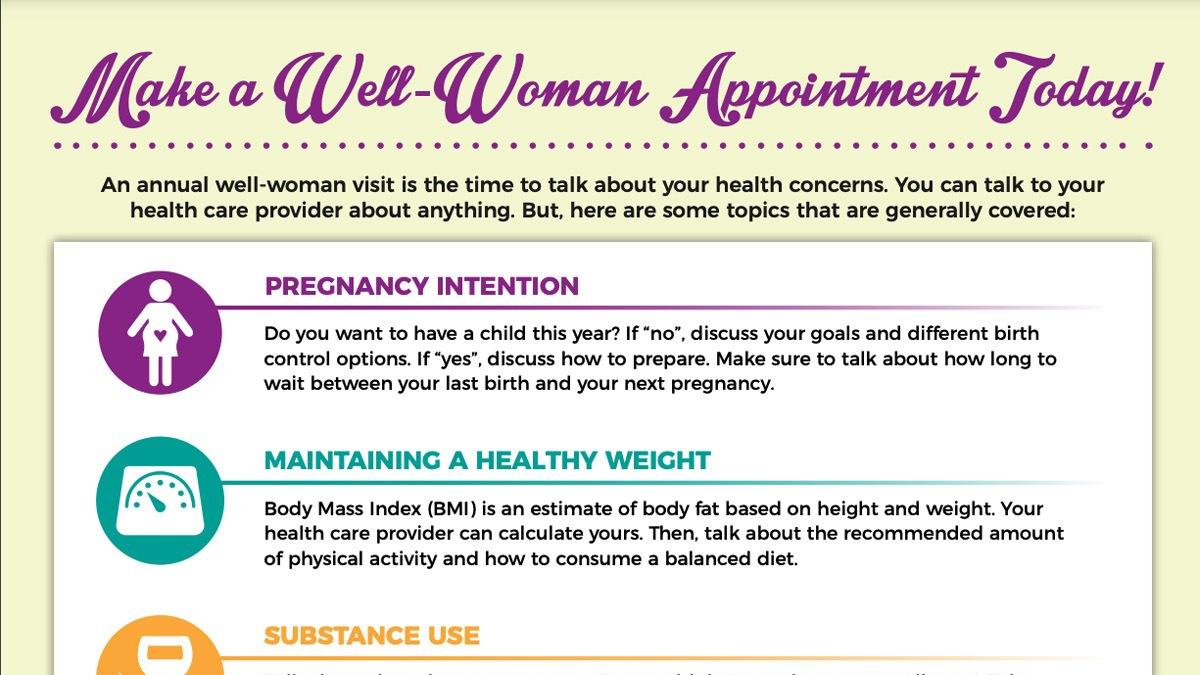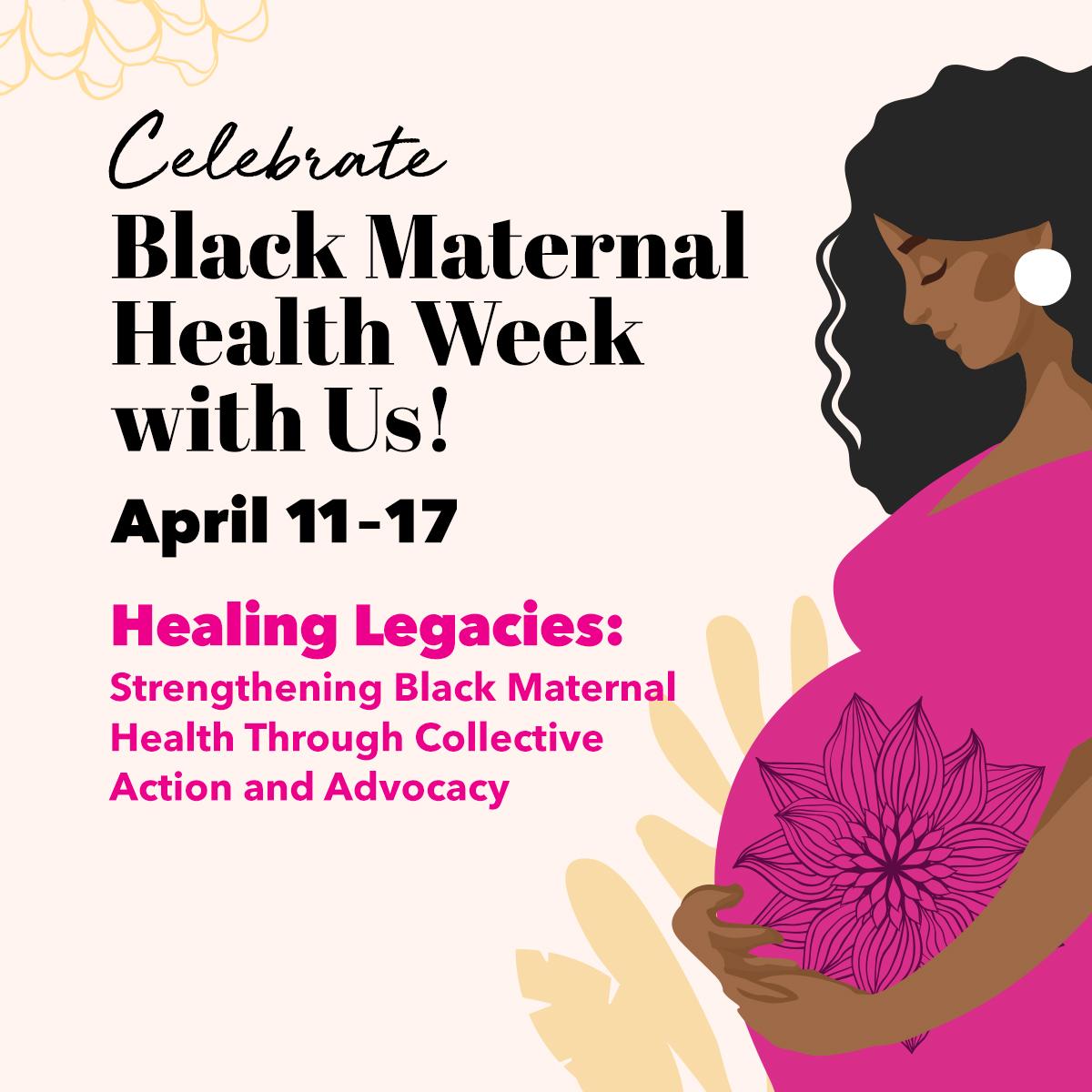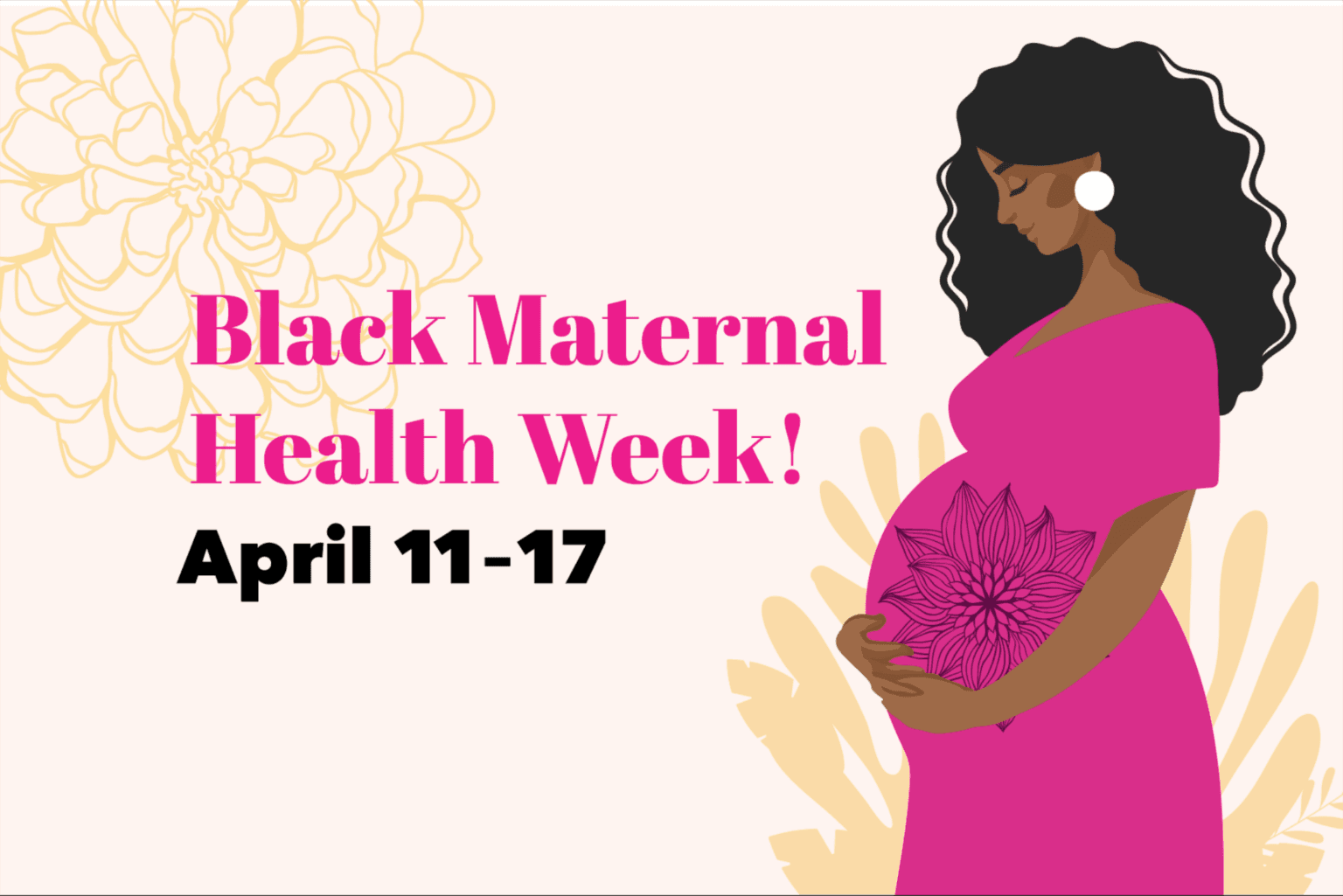Women’s Health
Take Charge of Your Health!
Your health matters now. Your whole life matters, so plan it out. Being healthy is the first step to having a good life. It’s all about taking care of you: your body and your mind.
Get Healthy Now, for You!
Are most days busy? Is your to-do list a mile long? Even though you’re busy, it’s important to make time to take care of your physical and emotional health, too. Here are a few tips to get or stay healthy:
Get moving.
Exercise helps you maintain a healthy weight and also manage stress. Aim for 60 minutes of moderate exercise, two to three times a week.
We’ve learned a person’s weight is an important factor in their overall health today and in the future. According to the CDC
, obesity places a woman at a greater risk of pregnancy complications such as preeclampsia, diabetes that occurs during pregnancy (gestational diabetes mellitus — GDM), stillbirth, and cesarean delivery. Obesity in adults increases the risk of developing health conditions later on in their life such heart disease, diabetes, joint problems, and breathing problems.
To get the most health benefits of physical activity, adults need:
At least 2-1/2 hours to 5 hours a week of moderate-intensity aerobic activity such as brisk walking or fast dancing. Aerobic activity should be performed in episodes of at least 10 minutes and should be spread throughout the week. Muscle-strengthening activities (resistance activities) like lifting weights or doing push-ups at least 2 days a week. All major muscle groups such as the legs, hips, back, abdomen, chest, shoulders, and arms should be worked.
Evidence from Health.gov
shows that physical activity has immediate health benefits. For example, physical activity can reduce anxiety and blood pressure and improve quality of sleep and insulin sensitivity. For older adults, physical activity also lowers the risk of falls and injuries from falls. Eat a healthy and balanced diet.
Choosing healthy foods and drinks more often can help you prevent or manage many health problems including diabetes, high blood pressure, and heart disease. Fill half your plate with fruits and vegetables, and split the other half between whole grains and lean protein.
Drink enough water.
Eight 8-ounce glasses per day is a great start.
Address emotional fatigue before it leads to burnout.
Take the time to develop healthy habits that help you to be emotionally fit and balanced.
Educate yourself on your reproductive cycle
. Understanding your reproductive cycle can help you be healthy. It can also be used as a tool to help you increase your odds of becoming pregnant once you’re ready.
Schedule your annual well-woman visit with your health care provider.
This is a yearly chance to talk about your health concerns and goals, and also your family history
. Be sure to also take a vitamin with 400 mg of folic acid every day.
Folic acid promotes women’s health, especially heart health.
Need tips on your oral health? Visit our Healthy Smiles program.
Practice healthy behaviors. Your health matters now. Helping women be healthy and change behavior before pregnancy is part of the solution.

What to Talk About with Your Health Care Provider
When you go to your annual well-woman visit
Your health care provider can help you:
- Discuss your pregnancy intentions. Are you ready for a baby? If no, how are you preventing pregnancy? Birth control is one choice, but are you aware of all your other options? If you are ready, discuss how to prepare for a pregnancy. Make sure to talk about how long to wait between your last birth and your next pregnancy.
- Talk about substance use. Are you drinking alcohol in moderation — that means up to two drinks a day? Taking drugs? Be honest about the amount and substance so your provider can help weigh the risks and benefits with you.
- Review medications and vitamins you are taking. Did you know some vitamins and drugs can’t be taken together or can cause harm? Make a list or take a picture of your vitamins and medications to make sure they are okay. Do not stop taking medications before talking to your provider.
- Manage your chronic conditions. If you have a chronic disease, it’s important that you discuss it and inform your health care provider about your illness, symptoms, and prescriptions. They can help you manage your condition.
- Talk about your emotional well-being. If you need a referral to a therapist, your provider’s office is often an excellent place to ask!
- Learn more about healthy relationships. Learn more about bullying for yourself or others in your life. Learn about intimate partner violence
and how to develop healthy relationships. It’s essential to be aware of red flags of unhealthy relationships, like a controlling partner or friends being hurtful on purpose. - Stay up to date on vaccinations
and health screenings. It’s important to know early about health conditions that you may have and prevent others. It’s also important to discuss your family’s health history. Your family’s health history may reveal your risk for developing certain diseases in the future. - Learn about environmental hazards. Could you be exposed to any chemical or physical hazards at home or at work? Talk to your provider about the health impacts of these hazards.

Plan it Out
What do you want out of life? You are a woman with a strong mind. You have the power to take control of your life and your choices. What do you need to be healthy and happy? Think about your wants and write them down. That’s how you start a Life Plan. Knowing your goals and values can guide your decision-making process. It helps you say “no” to things that could take you away from that plan.
Need help creating a Life Plan? Our My Life. My Plan: Women program can help.
Kids: Now, Later, or Never?
Not sure if or when you want kids? That’s okay! It’s your choice. If you do want kids, when and how many? If not now or no, consider birth control options. Making a plan can support you in sticking to your decision.
In Delaware, only 55% of women indicated their pregnancy was planned. Why is this dangerous? Because three days after you miss a period, if you are pregnant, your unborn baby can be affected by your health habits. So getting healthy before pregnancy is key. That means even if you don’t know you’re pregnant yet, you can harm your baby by drinking alcohol, smoking, or using drugs. It’s better when a woman plans her pregnancy for her health and for the health of her baby.
Need effective birth control without paying too much? That’s what our program Delaware CAN does. It can connect you to low-cost or no-cost birth control.
Delaware CANNot ready for kids ... yet?
Your health matters for you regardless of whether you have children or not. We have learned that your health now is related to a healthy baby in the future. Your health matters now. Helping women be healthy and change behavior before pregnancy is part of the solution.
If you’re planning for a baby soon, or even just having unprotected sex, take these steps
Certain chemicals, molds, tobacco, lead, and radon can harm your baby and your family. Make sure your home is healthy. Take 400 mg of Folic Acid Every Day — Folic acid promotes women’s health, especially heart health. Stop Drinking Alcohol, Smoking, and Using Recreational Drugs. Avoid Toxins and Environmental Dangers. Reach and Maintain a Healthy Weight. Get Help for Violence or Abuse of Any Kind . Learn Your Family’s Health History. Do you have the financial means to support you and your baby? Put together a financial plan to help understand how much money it will take to live the life you want and be financially independent. Health care experts encourage women to wait at least 18 months between giving birth and getting pregnant again.
Following these steps at least three months before you get pregnant can give your baby the best chance at a healthy start. Need help getting it all done? Help is available. Healthy Women, Healthy Babies is a program for women who are Delaware residents. It helps with extra services for pregnant women, those planning to be pregnant, or those who just want to live healthier lives. These services include personal health and wellness, nutrition, family planning, emotional health, and prenatal care if you get pregnant.
Healthy Women, Healthy BabiesCheck out our Home Visiting page. It introduces you to a free program for Delaware women that offers personal health, wellness, nutrition, mental health, and prenatal care.
Home VisitingNeed Help with Abuse?
Family changes and the pressure that comes with them can lead to physical and/or emotional violence in the home.
If you are in immediate danger, call 911.
If you are in an abusive relationship, or know someone who is, call your local 24-hour domestic violence hotline to learn about all of your options, including shelter, legal assistance, support groups, and more. The hotline staff can help you create a safety plan personalized for your situation.
The Delaware Coalition Against Domestic Violence offers a 24-hour intimate partner violence hotline.
Need Assistance?
Whether it’s housing, health insurance, or another urgent need, Help Me Grow at Delaware 2-1-1 is a free one-stop call center to answer questions or get you the help you need. Call Delaware 2-1-1 now! You may also text your ZIP code to 898211.
Breaking Down Barriers
Additional Resources
Below are resources and outside services that can help.
The National Maternal Mental Health Hotline
Call or text 1-833-TLC-MAMA (1-833-852-6262). 24/7, free, confidential hotline for pregnant and new moms. Available in English and Spanish.
The National Suicide Prevention Lifeline
Call or text 988 to be connected to a local Lifeline response center.
PPE Pre-Training Checklist
Want to become a PPE? Review the pre-training checklist to become a Peer Educator, complete, and return to your program administrator. The checklist includes access links to all information needed.
Community Health Worker (CHW)
A Community Health Worker (CHW) helps women to get and stay healthy by linking them to key resources to meet specific needs related to the Social Determinants of Health. CHWs complement a woman’s health care team by addressing food insecurity, transportation, housing needs, and much more.


